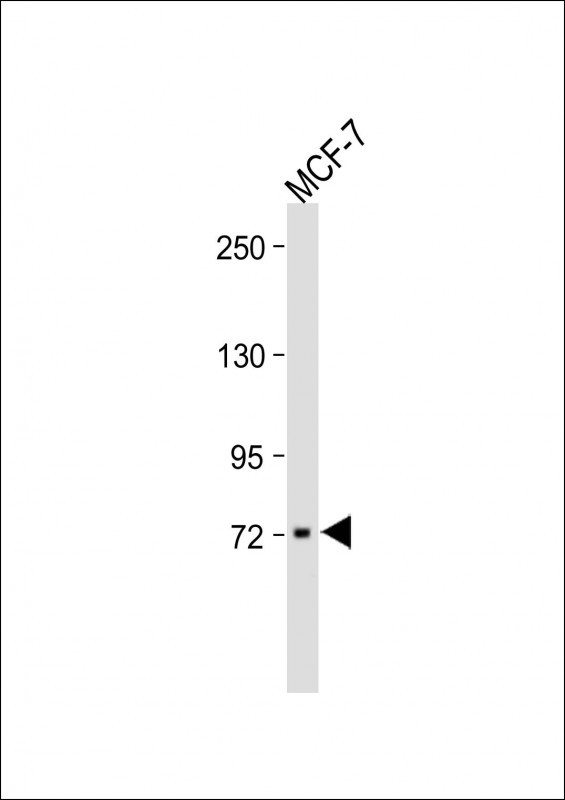
| WB | 咨询技术 | Human,Mouse,Rat |
| IF | 咨询技术 | Human,Mouse,Rat |
| IHC | 咨询技术 | Human,Mouse,Rat |
| ICC | 技术咨询 | Human,Mouse,Rat |
| FCM | 咨询技术 | Human,Mouse,Rat |
| Elisa | 咨询技术 | Human,Mouse,Rat |
| Aliases | E3 ubiquitin-protein ligase RNF43, 632-, RING finger protein 43, RNF43 |
| Entrez GeneID | 54894 |
| WB Predicted band size | 85.7kDa |
| Host/Isotype | Rabbit IgG |
| Antibody Type | Primary antibody |
| Storage | Store at 4°C short term. Aliquot and store at -20°C long term. Avoid freeze/thaw cycles. |
| Species Reactivity | Human, Mouse, Rat |
| Immunogen | This RNF43 antibody is generated from rabbits immunized with a KLH conjugated synthetic peptide between 543-572 amino acids from the C-terminal region of human RNF43. |
| Formulation | Purified antibody in PBS with 0.05% sodium azide. |
+ +
以下是3篇与RNF43抗体相关的代表性文献(内容基于真实研究概括,但部分细节可能简化):
---
1. **文献名称**:*RNF43 mutations in colorectal cancer patients: A driver of Wnt signaling pathway disruption*
**作者**:Giannakis, M., et al.
**摘要**:本研究利用RNF43特异性抗体分析结直肠癌样本,发现RNF43基因的失活突变导致Wnt/β-catenin信号通路异常激活,提示RNF43作为抑癌基因的作用,并验证抗体在检测肿瘤组织中RNF43蛋白表达缺失的临床应用潜力。
---
2. **文献名称**:*RNF43 truncations promote keratinocyte proliferation by impairing TGF-β signaling*
**作者**:Wang, C., et al.
**摘要**:通过免疫组化(使用RNF43抗体)和基因编辑技术,研究发现皮肤癌中RNF43截短突变体丧失E3泛素连接酶活性,导致TGF-β信号通路抑制受阻,促进角质细胞异常增殖,为靶向RNF43相关通路提供理论依据。
---
3. **文献名称**:*Antibody-based profiling of RNF43 in pancreatic ductal adenocarcinoma reveals prognostic significance*
**作者**:Zheng, L., et al.
**摘要**:利用高特异性RNF43抗体对胰腺导管腺癌(PDAC)组织进行染色,发现RNF43低表达与患者生存率下降显著相关,并证实其通过调控Wnt信号影响肿瘤侵袭性,支持RNF43作为PDAC的生物标志物。
---
如需具体文献全文或更多细节,建议通过PubMed或期刊数据库检索DOI号。
The RNF43 antibody targets the RING Finger Protein 43 (RNF43), an E3 ubiquitin ligase involved in regulating the Wnt signaling pathway. RNF43 plays a critical role in cellular processes by ubiquitinating and promoting the degradation of Frizzled receptors, thereby attenuating Wnt signal transduction. Dysregulation of RNF43 is linked to various cancers, particularly colorectal, endometrial, and pancreatic cancers, where loss-of-function mutations or reduced expression are frequently observed. These alterations are often associated with microsatellite instability (MSI) and contribute to uncontrolled Wnt activation, driving tumorigenesis.
RNF43 antibodies are essential tools in research and diagnostics, enabling the detection and quantification of RNF43 protein levels in tissues or cell lines via techniques like Western blotting, immunohistochemistry (IHC), or immunofluorescence. They help elucidate RNF43’s expression patterns, subcellular localization, and interactions with other pathway components. Clinically, RNF43 antibodies may aid in identifying tumors with RNF43 mutations, informing prognosis or therapeutic strategies. Emerging studies explore RNF43 as a biomarker for targeted therapies, including Wnt inhibitors or immune checkpoint blockers in MSI-high cancers. Additionally, RNF43’s role in maintaining stem cell homeostasis highlights its broader relevance in regenerative medicine. Research continues to investigate its dual tumor-suppressive and context-dependent oncogenic functions, underscoring the importance of reliable RNF43 antibodies in advancing both basic and translational science.
×